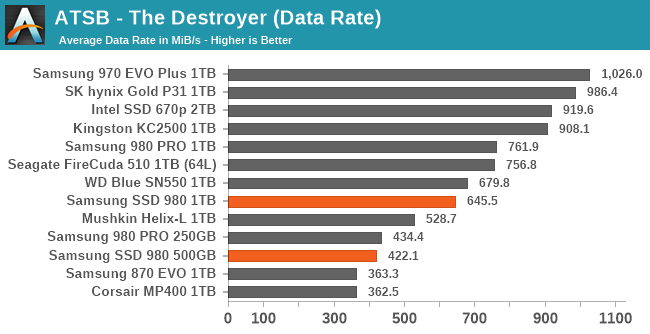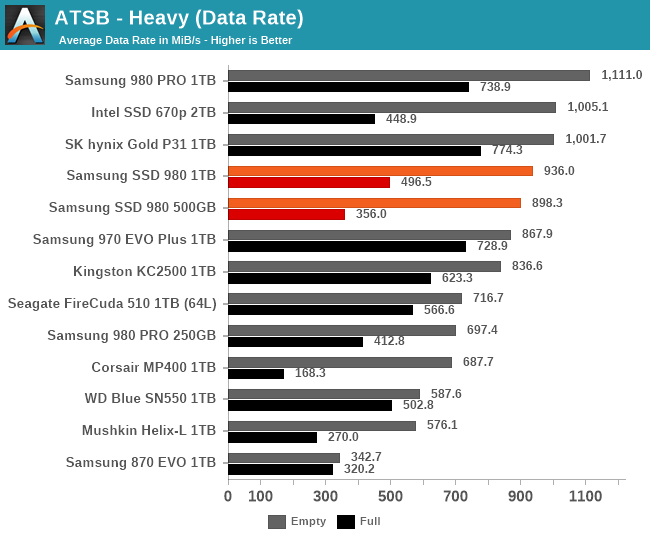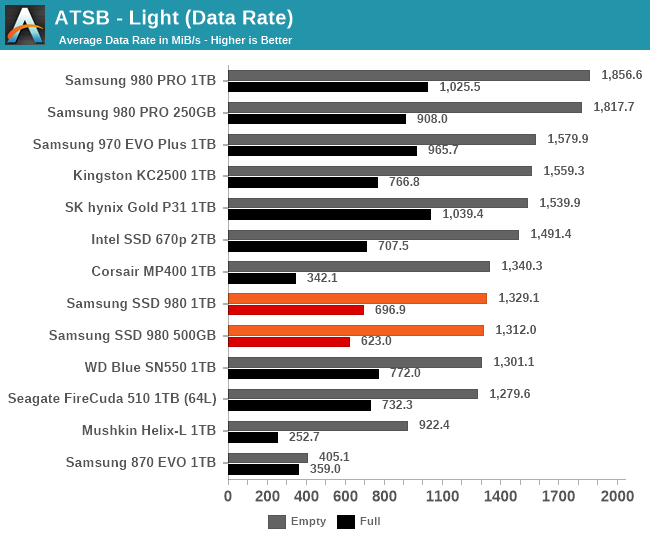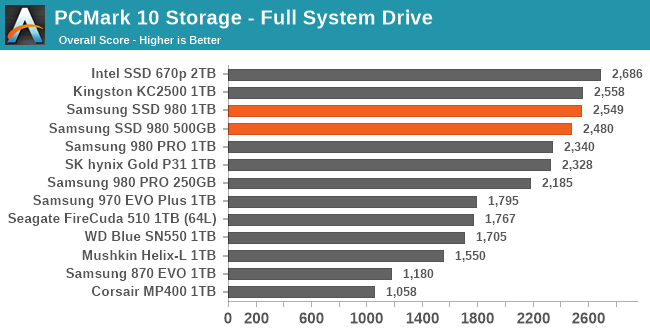The Samsung SSD 980 (500GB & 1TB) Review: Samsung's Entry NVMe
by Billy Tallis on March 9, 2021 10:00 AM ESTAnandTech Storage Bench - The Destroyer
Our AnandTech Storage Bench tests are traces (recordings) of real-world IO patterns that are replayed onto the drives under test. The Destroyer is the longest and most difficult phase of our consumer SSD test suite. For more details, please see the overview of our 2021 Consumer SSD Benchmark Suite.
 |
|||||||||
| Average Data Rate | |||||||||
| Average Latency | Average Read Latency | Average Write Latency | |||||||
| 99th Percentile Latency | 99th Percentile Read Latency | 99th Percentile Write Latency | |||||||
| Energy Usage | |||||||||
The Samsung SSD 980 turns in decent overall scores for an entry-level drive on The Destroyer, but it doesn't quite match the performance of the WD Blue SN550. In particular, Samsung's latency scores are quite a bit higher, especially for write operations. The 500 GB 980 struggles compared to the 1 TB model, but still pulls off an overall average data rate that's better than the 1TB SATA 870 EVO.
The SSD 980 does use less energy to complete The Destroyer than the 970 EVO Plus or 980 PRO did: slower and lower power worked out to lower overall energy consumption. But Samsung's performance-oriented NVMe drives have long been notable for their high energy consumption, and the SSD 980's results are nothing special in the context of other competitors on the market.
AnandTech Storage Bench - Heavy
The ATSB Heavy test is much shorter overall than The Destroyer, but is still fairly write-intensive. We run this test twice: first on a mostly-empty drive, and again on a completely full drive to show the worst-case performance.
 |
|||||||||
| Average Data Rate | |||||||||
| Average Latency | Average Read Latency | Average Write Latency | |||||||
| 99th Percentile Latency | 99th Percentile Read Latency | 99th Percentile Write Latency | |||||||
| Energy Usage | |||||||||
Moving on to the Heavy test, the Samsung SSD 980 improves its standings considerably. Performance when running the test on an empty drive is now competitive with mainstream TLC NVMe drives, including the latency scores. When the test is run on a full drive, the SSD 980's performance drops considerably, and it ends up on par with the WD Blue SN550. The 99th percentile latency scores are much higher for the full-drive test runs, but it's not an egregious outlier like a few of the other entry-level NVMe drives.
AnandTech Storage Bench - Light
The ATSB Light test represents ordinary everyday usage that doesn't put much strain on a SSD. Low queue depths, short bursts of IO and a short overall test duration mean this should be easy for any SSD. But running it a second time on a full drive shows how even storage-light workloads can be affected by SSD performance degradation.
 |
|||||||||
| Average Data Rate | |||||||||
| Average Latency | Average Read Latency | Average Write Latency | |||||||
| 99th Percentile Latency | 99th Percentile Read Latency | 99th Percentile Write Latency | |||||||
| Energy Usage | |||||||||
On the Light test, the Samsung SSD 980's performance is a step below mainstream TLC NVMe drives with DRAM, but it's not a huge difference. Even for the full-drive test runs, the latency scores all stay better than the 870 EVO SATA SSD, so there's nothing to complain about in that department. Energy consumption is a bit on the high side given that low-end drives often save quite a bit of power on light workloads, but the SSD 980 is still an improvement over Samsung's performance-oriented NVMe drives.
PCMark 10 Storage Benchmarks
The PCMark 10 Storage benchmarks are IO trace based tests similar to our own ATSB tests. For more details, please see the overview of our 2021 Consumer SSD Benchmark Suite.
 |
|||||||||
| Full System Drive | Overall Score | Average Bandwidth | Average Latency | ||||||
| Quick System Drive | Overall Score | Average Bandwidth | Average Latency | ||||||
| Data Drive | Overall Score | Average Bandwidth | Average Latency | ||||||
The Samsung SSD 980 scores very well on the Full System Drive, likely helped by the large SLC caches. Its rankings fall a bit with the Quick System Drive and Data Drive tests as more drives are also able to fit the tests within their SLC caches or pull ahead with higher sequential IO speeds.










54 Comments
View All Comments
Samus - Wednesday, March 10, 2021 - link
Quite ironically to my above statements, I've never seen an PM\SM851 OEM Samsung SSD fail. Not sure what's up with that. They're common OEM drives for HP, Dell and Lenovo circa 2013-2016 and I've seen a lot of those still in service, and selling dirt cheap on eBay. It's no secret the OEM drives have nerfed firmware that lacks some throughput but that has always had me wonder if the M-series controllers are killing themselves at higher clock rates...there is a bit of precident to this as the Intel 730's based on the DC-class drives and controllers were higher clocked and seemed to fail a bit, too.damianrobertjones - Tuesday, March 9, 2021 - link
That's a worry, as nearly EVERY machine with an SSD, in work, is Samsung based. Mostly m.2. due to using intel Nucs.Not one has failed so far.
Kamen Rider Blade - Tuesday, March 9, 2021 - link
Thanks to this article, I discovered the:SK Hynix Gold P31 1TB
A very solid & balanced 1 TB SSD =D
Samus - Thursday, March 11, 2021 - link
I'm running the same SSD in my desktop AND laptop now. Replaced the WD Black in my desktop which kept throttling near 70C in what I'd consider an adequately cooled case. The Hynix P31 rarely even reaches 60F.Great drive. I wish they came in larger capacity :(
fazalmajid - Tuesday, March 9, 2021 - link
So if HMB requires host OS support, how compatible is it with Linux or less common alternative OSes like the BSDs or Solaris/Illumos?Billy Tallis - Tuesday, March 9, 2021 - link
Based on a quick search of online man pages, at least FreeBSD has HMB support. A man page for Illumos dated 2018 makes no mention of HMB, and I don't think they have much reason to implement that feature since enterprise SSDs wouldn't use HMB. But it's also not too complicated to support.sonny73n - Wednesday, March 10, 2021 - link
Performance is entry level but price is not.nvmnghia - Wednesday, March 10, 2021 - link
How is the HBA test designed? Read some < cache size data over and over?nvmnghia - Wednesday, March 10, 2021 - link
I mean HMBoRAirwolf - Wednesday, March 10, 2021 - link
I don't understand why anybody would buy one of these when you can get an SK Hynix Gold P31 for the same price on Amazon. I got an Adata SX8200 Pro 1TB for $100 from best buy the other day, which has DRAM cache. Granted it is the SM2262G with Samsung 64L TLC, but I'll still take that over a DRAM-less drive any day of the week.